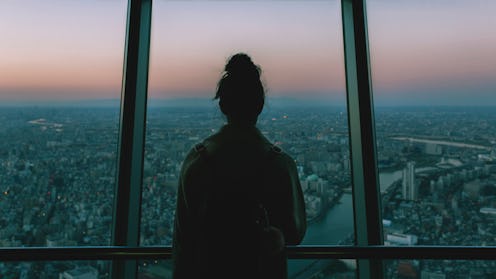Life
Stress is a severe health issue worldwide. The National Institute of Mental Health explains that long-term exposure to chronic stress can harm the immune system, digestion, and fertility, as well as raise risks of heart problems, diabetes, mental disorders, among other problems. And various factors in living environments worldwide can impact stress levels, from how much discrimination you encounter to how annoying your commute to work is. Quantifying the exact stress levels of different locations with all these factors is difficulty but a new study commissioned by Zipjet, a London-based laundry delivery service, has sought to create a "stress ranking" of the most and least stressful cities around the world.
According to the UN, 54.5 percent of the world's population live in cities as of 2016, and that's projected to rise to 60 percent by 2030. And considering how urbanization affects us, this isn't really great news for human health. A study published in Nature in 2011 found that urban and city living actually changes the human brain; if you currently live in a city, your amygdala (which controls fear and, yes, stress) is likely more active than if you live in the country. Studying precisely which cities affect us most on stress scales is a pretty delicate question, as stress is highly personal and cultural, but this recent analysis showed some pretty interesting findings.
How Do You Measure A City's Stress Levels?
The Zipjet study is, of course, not peer-reviewed nor affiliated with an academic institution, but that doesn't mean it doesn't have interesting conclusions. Zipjet Managing Director Florian Färber tells Bustle that Zipjet as a company aims to lower stress levels for city dwellers, and as such, the company became interested in comparative stress levels in different cities. "We thought it might be illuminating to see where in the world the people are most stressed, and why this is," he says. "As technology improves, digitization is helping us remove monotony, tedium, and unneeded stress from our lives, and Zipjet is proud to be part of that change." With bases in various cities, it's also possible Zipjet was looking at which places worldwide would benefit most from their stress-busting services.
The measures they used to estimate stress levels were wide-ranging and looked at many different factors, which were then weighted and put into a final "scoring" system. They looked at 500 cities worldwide, then ranked the 150 cities that made up the most and least stressed. (It's unclear how they picked the 500; there were 1,692 cities worldwide with a population of at least 300,000 in 2014).
The cities were ranked in along four lines: the city itself, measuring density, green spaces, public transport, traffic congestion, perceptions of security, and sunshine hours; pollution, measuring air, noise and light pollution levels; finance, measuring unemployment, debt per capita, social security, and family purchasing power; and people, measuring mental health, physical health, gender equality, and racial equality.
Unfortunately, Zipjet isn't a recognized academic institution, so they haven't needed to link to the exact sources of their data, and some of their methodology, though outlined on their webpage, is slightly vague. For instance, ranking a city's mental health meant looking at local data about suicide rates and how many psychologists were working per capita, along with other unnamed measures. They've relied in many categories on "local reports" for their data source, which interested observers can't inspect for accuracy. And their particular way of weighting which factors matter more than others is open to criticism (should pollution matter less than finance?). They also don't take into account factors like affordability, education, or work-life balance, which are used in other city ranking systems that aim to assess population happiness, like the Sustainable Cities Index created by the consultancy Arcadis. The sources they do name, including the World Health Organization and the World Economic Forum, are legit, so while we can't take the analysis as wrote fact, we can read some of their conclusions as interesting suggestions.
The Least Stressful Places To Live Are Small, German, And Gender-Equal
The top five least stressed cities on Zipjet's ranking are Stuttgart, Germany; Luxembourg; Hannover, Germany; Bern, Switzerland; and Munich, Germany. Cities in the United States doesn't enter into the rankings of least-stressed cities until number 12, with laid-back Seattle, and only has two other entries in the top 50 (Boston, at number 30, and San Francisco, 40). Most of the U.S.'s other big cities (Miami, Los Angeles, Chicago, and New York) clustered around the 80 mark.
So what's holding American cities back? Comparing the number one, Stuttgart, to mid-level Miami shows an interesting series of factors. By the measures used in this study, Miami is actually a lot less polluted than Stuttgart, and has similar issues with public transport, but when it comes to other factors, particularly financially and socially, Miami comes out as a lot more stressful. The things that really held Miami back were peoples' feelings of security, mental health issues, the big lack of money spent on social security, and gender inequality.
When it came to ranking gender inequality alone — which Zipjet calculated using gender gap report data from the World Economic Forum and local stats on labour force participation — the United States did pretty badly. Chicago was ranked the 55th most gender-equal city: It was the highest-ranked from America, but it was beaten by virtually every European city, Manila, Hanoi, and every city in Canada. The fact that gender inequality and discrimination factors heavily into stress levels for women is well-known, but this sort of analysis show it up in alarming lights.
So if you want to improve your stress levels by moving somewhere a bit less likely to raise your blood pressure, it might be a good idea to research which cities do the best on gender equity. I hear Reykjavik, Iceland, has some pretty cool sites to see.
